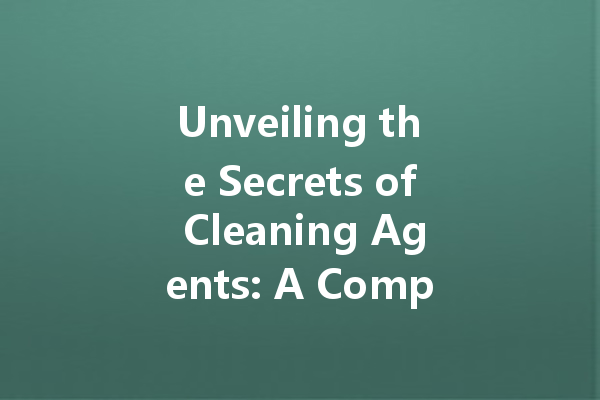Cleaning agents are essential for maintaining hygiene and cleanliness in our daily lives. From household chores to industrial applications, understanding the types and uses of these products can help us make informed decisions. In this article, we’ll explore various cleaning agents, their effectiveness, and how to select the right one for your specific needs.
What Are Cleaning Agents?
Cleaning agents are substances designed to aid in the removal of dirt, grime, stains, and contaminants from surfaces. They come in various forms, including liquids, powders, and sprays, and can be made from natural or synthetic ingredients. Common categories of cleaning agents include detergents, solvents, acids, and alkaline cleaners, each serving a distinct purpose.
Types of Cleaning Agents
Detergents
Detergents are surfactants that help break down grease and oil, making them effective for laundry and dishwashing. They come in concentrated and ready-to-use forms, providing versatility for different cleaning tasks. Look for biodegradable options if you are environmentally conscious.
Solvents
Solvents are used to dissolve and remove sticky substances like paint, glue, and oils. Common household solvents include rubbing alcohol and acetone. Always ensure proper ventilation when using these products, as their fumes can be harmful.
Acid Cleaners
Acid cleaners, such as vinegar and hydrochloric acid, are effective for removing mineral deposits, rust, and tough stains. They are commonly used in bathrooms and kitchens. However, it’s crucial to use them with caution and ensure they are not mixed with bleach, which can create toxic fumes.
Alkaline Cleaners
Alkaline cleaners, like baking soda and ammonia, are effective against organic soils and fats. They can be used for general cleaning purposes and are often found in household cleaners and degreasers.
Choosing the Right Cleaning Agent
When selecting a cleaning agent, consider the following factors:
Surface Type
Different surfaces require different cleaning agents. For example, acidic cleaners should be avoided on natural stone surfaces, while gentle detergents may be suitable for delicate fabrics. Always check labels for compatibility.
Safety and Environmental Impact
Opt for non-toxic and environmentally friendly options whenever possible. Many brands now offer eco-friendly cleaning agents that are safe for both humans and the environment without sacrificing cleaning performance.
Specific Applications
Consider what you need the cleaning agent for. Are you tackling a specific stain, cleaning a particular surface, or disinfecting a shared space? Identifying your primary cleaning goal will help narrow down your options.
Common Household Cleaning Agents
All-Purpose Cleaners
All-purpose cleaners are versatile and can be used on various surfaces, making them ideal for everyday cleaning tasks. They often contain a blend of detergents and surfactants for optimal performance.
Disinfectants
Disinfectants are essential for killing germs and bacteria. Products containing bleach or alcohol are common choices, especially in kitchens and bathrooms. Ensure that you follow the instructions for effective disinfection.
Specialty Cleaners
Specialty cleaners target specific tasks, such as glass cleaners, floor cleaners, and bathroom mildew removers. Using these targeted products can enhance cleaning efficiency and yield better results.
Understanding Labels and Ingredients
Reading labels is crucial when choosing cleaning agents. They provide information about ingredients, usage instructions, safety precautions, and environmental impact. Familiarize yourself with key terms like “biodegradable,” “non-toxic,” and “hypoallergenic” to make informed choices.
Tips for Safe Use of Cleaning Agents
Wear Protective Gear
When using strong cleaning agents, it’s essential to wear gloves, goggles, and masks to protect your skin, eyes, and respiratory system from harmful chemicals.
Proper Ventilation
Ensure good air circulation in the area you’re cleaning by opening windows or using fans. This helps dissipate fumes and reduces the risk of inhalation.
Store Safely
Always store cleaning agents out of reach of children and pets. Keep them in their original containers, clearly labeled, and away from heat sources.
The Future of Cleaning Agents
As environmental awareness grows, many companies are innovating to create safer, more sustainable cleaning products. From plant-based ingredients to refillable packaging, the cleaning industry is evolving to meet consumer demands for effective yet eco-friendly options.
By understanding the various types of cleaning agents and how to use them effectively, you’ll be better equipped to tackle all your cleaning tasks with confidence and care.

